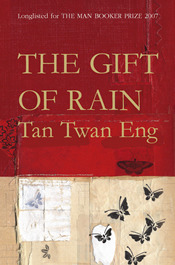Given that I had read ten of the thirteen Booker longlistees over a few weeks I didn’t expect Tan Twan Eng’s debut, The Gift Of Rain to take too long to read. Animal’s People, for example, is almost similar regarding page count. But this novel was so dense with luscious prose that it’s taken well over a week to get through. And it’s been an enjoyable journey, though not without its lows.
Narrated by Philip Hutton (an elderly man of Chinese and British parentage) The Gift Of Rain looks back to Penang in 1939. While his family is taking an extended trip to England, the sixteen year old Philip meets a Japanese diplomat named Hayato Endo who offers to teach him the art of aikido. Thus Philip and Endo enter into a relationship of sensei and student. But, when the Japanese enter World War II with attacks on Malaya and Pearl Harbour, Philip is left to question where his loyalties lie: to his sensei or to his people.
Operatic in scope The Gift Of Rain follows Philip’s journey from an innocent sixteen year old boy to a mature twenty-something knowledgable in the ways of the world. Along the way he encounters friendship and loss; strengthens his bond with his family, notably his father; and finds a sense of purpose. He gets caught up in the workings of the Japanese, all the while working against them: a hero to some, a traitor to others. As his mixed parentage suggests, he’s always going to be a conflicted soul.
At one point Philip Hutton says “the most rewarding way to see the place one lives in is to show it to a friend” and it almost seems as if these are the words of Eng himself – with the reader as friend – as The Gift Of Rain is awash with descriptions of Malaya, whether it be the sampans floating off the coast, street peddlars selling their wares, or the landscape all around. And if all this description was a feast for the eyes, the other senses get teased too:
And there were the smells, always the smells that remain unchanged to this day – the scents of spices drying in the sun, sweetmeats roasting on charcoal grills, curries bubbling on fiery stoves, dried salted fish swaying on strings, nutmeg, pickled shrimp – all these swirled and mixed with the scent of the sea, fusing into a pungent concoction that entered us and lodged itself in the memory of our hearts.
With each description the historical Malaya comes to life on the page and the pride that Hutton takes in it is never in doubt:
I have never seen the light of Penang replicated anywhere else in the world – bright, bringing everything into razor-sharp focus, yet at the same time warm and forgiving, making you want to melt into the walls it shines on, into the leaves it gives life to. It is the kind of light that illuminates not only what the eyes see, but also what the heart feels.
It would be a spoiler to say too much about the story of The Gift Of Rain, given its many twists and turns. The pacing of the novel, however, is relaxed. Where there is much happiness in early scenes the mood darkens in the second section and Malaya, under Japanese occupation, becomes a much darker place, one where rebels fight the intruders to a stalemate and suspected criminals dig their own graves:
There was not even an order to cease digging. Goro gave a hand signal and the guards started shooting. The gunshots exploded like a string of firecrackers set off during the Chinese New Year and the bodies tumbled into the wet, exposed earth.
The problem I had with The Gift Of Rain is that I got lost amongst the description. While I had made a good start to it, it soon become a struggle to read. It felt like little was happening in the story and while the prose sustained my interest, it felt like it was failing to sustain the narrative. But, once the second section began, it became a joy to read again and I was won over. And while the novel seeks to explain its title, I wonder if the rain can be a metaphor for emotional tears, for the shedding of these makes us human.
Overall it’s an enjoyable book, weaving a rich tapestry of honour, deceit, and loss that captures a time and place lost to history with skill. It also looks at World War II from an angle not usually explored, giving it an air of originality. It features a large cast of characters who felt real although I often wonder, with snippets of wisdom lacing sentences, if people of the Orient speak that way. Or ever did. The boring parts (to me, anyway) are a small price to pay for the whole package, because it’s worth getting swept away on.
